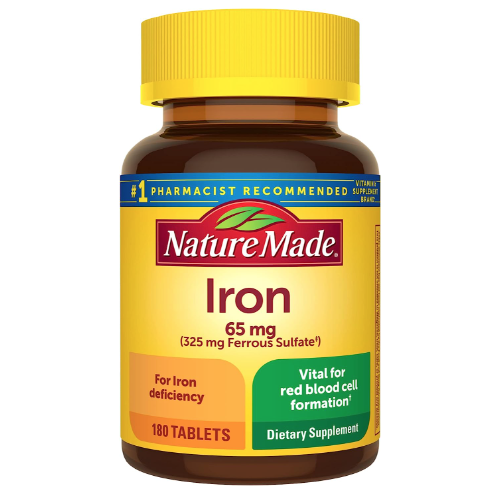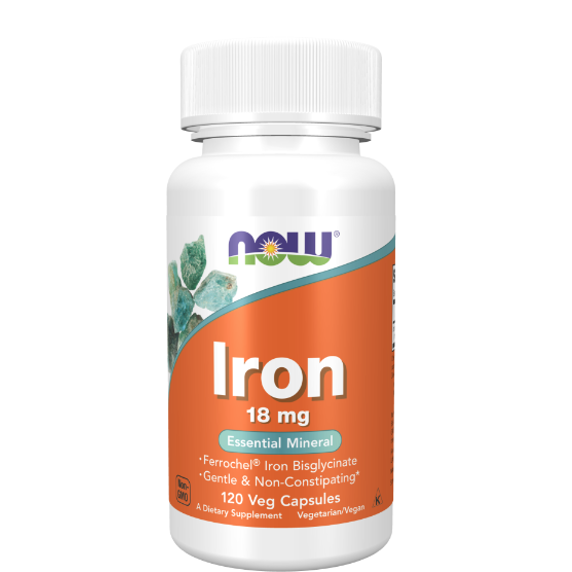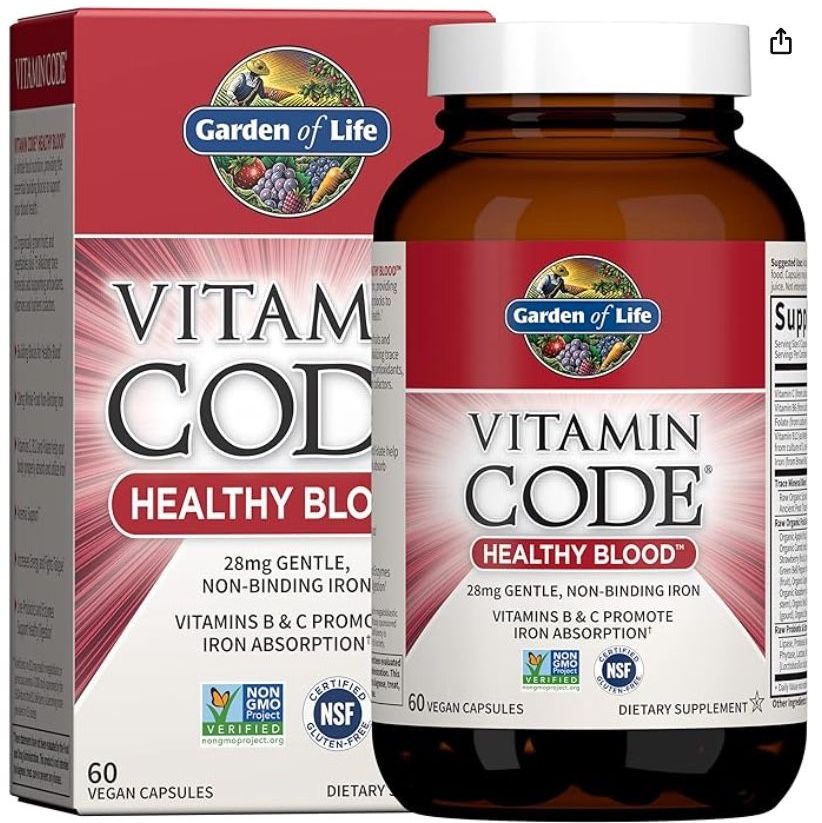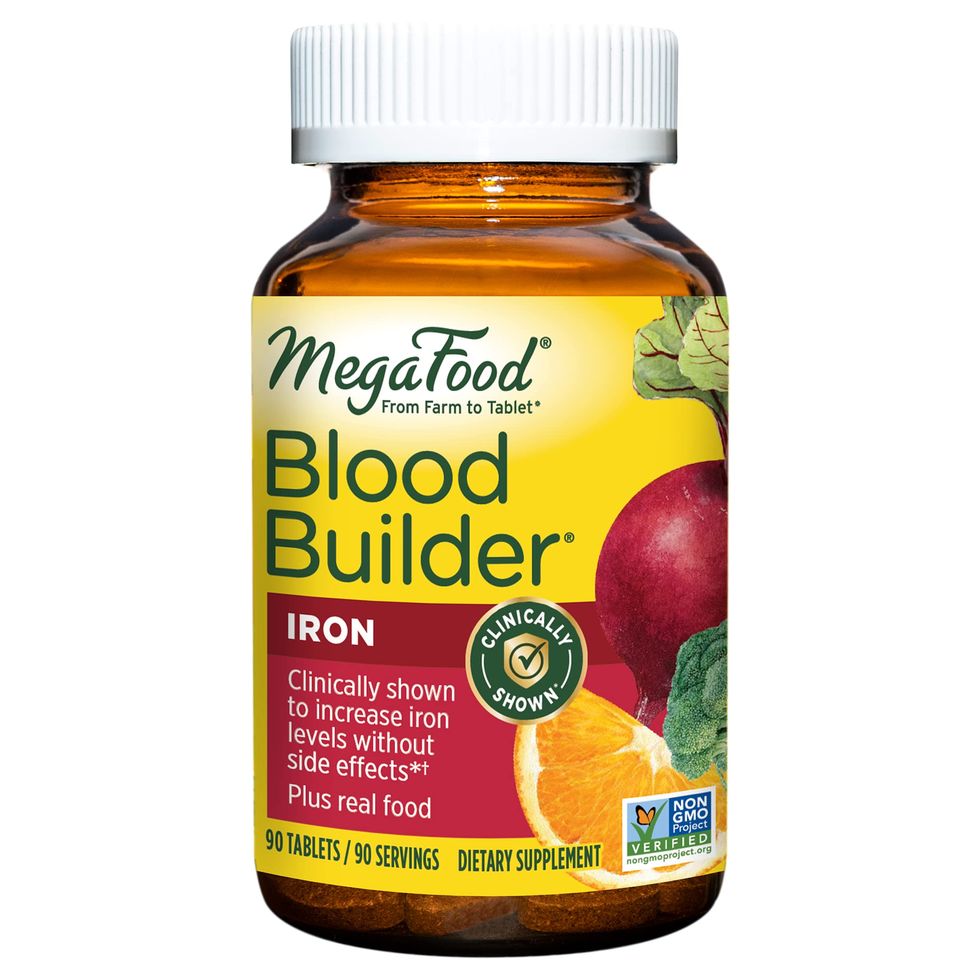The Best Iron Supplements That Are Gentle on Your Stomach, According to Nutritionists (original) (raw)
1
Best Overall
Thorne Research Iron Bisglycinate
Pros
- Formulated to minimize gastrointestinal side effects
- NSF Certified for Sport
- One capsule serving size
Cons
- No vitamin C to aid absorption
Conventional forms of iron, like ferrous sulfate, may cause gastrointestinal side effects like nausea and constipation. But this option from Thorne includes Ferrochel iron bisglycinate that has been clinically studied to help optimize iron absorption and minimize common side effects. It only requires one capsule daily and provides a substantial 25 milligram dose, but keep in mind that the supplement does not contain vitamin C which is ideal to help aid absorption.
Most notably, our registered dietitians point out that this product is NSF Certified for Sport, meaning that it has been tested for compliance with label claims and to ensure the absence of more than 200 substances banned by many major athletic organizations.
Amazon reviewers like that the pills are relatively small and easy to swallow. Many have also seen significant improvements in their iron levels and symptoms after taking the supplement for a few weeks. "Daughter had low iron levels. We tried the prescription iron tablets and they created more problems and didn’t help her iron levels. This product brought her into the normal range in a blood test within four weeks," one reviewer wrote.
| Type | Ferrochel iron bisglycinate |
|---|---|
| Iron dose | 25 mg |
| Serving size | One capsule |
| Price per dosage | $0.23 |
2
Best Value
Nature Made Iron 65mg
Pros
- Affordable
- No synthethic dyes or artificial flavors
- One capsule daily
Cons
- No vitamin C to optimize absorption
- May cause gastrointestinal upset for some
You'll find a rich 65 milligrams of iron in this cost-effective supplement from Nature Made. A serving is only one tablet, and the supplement is free from synthetic dyes and artificial flavors. The gluten-free choice is quite potent and can support healthy iron levels, but it doesn't contain any additional ingredients like vitamin C to aid absorption.
Most importantly, our registered dietitians point out that this supplement is United States Pharmacopeia (USP) verified, meaning it has passed rigorous testing to ensure quality and purity. It's quite a potent dose that will surely help increase levels, but our experts say that the ferrous sulfate form may not be tolerated well by certain individuals.
With over 32K five-star reviews on Amazon, this supplement marries quality and affordability. Both our experts and online reviewers like that the product is a small tablet and pretty easy to swallow. "I’ve been taking these for months. When I went to go get my levels check it did go up from my last visit," one reviewer said. "I've noticed an improvement in my energy levels and overall well-being," said another reviewer.
| Type | Ferrous sulfate |
|---|---|
| Iron dose | 65 mg |
| Serving size | One tablet |
| Price per dosage | $0.03 |
Advertisement - Continue Reading Below
3
Best Non-Constipating
Now Iron 18 mg
Now 12% Off
Credit: Now Foods
Pros
- Affordable
- Clinically studied form of iron
- Gentle on stomach
Cons
- No vitamin C to optimize absorption
Nausea, gas and constipation are a few of the many digestive side effects people may experience when taking an iron supplement, according to a meta-analysis.
But when it comes to gentle and non-constipating iron supplement from Now, it provides 18 milligrams of Ferrochel iron bisglycinate which has been clinically studied to show fewer instances of gastrointestinal upset than iron supplementation with ferrous sulfate. Each daily capsule is recommended to be taken with a meal.
The family-owned brand has been a leader in the health and wellness industry for over 50 years thanks to their extensive testing methods and quality. Our experts were very impressed by the level of testing and quality control that Now conducts.
"Doctor recommended it to me and I love it. Blood tests show my levels came up and I have no digestion issues from it," one reviewer said. Many reviewers agree, saying that they had no gastrointestinal symptoms from the supplement. But keep in mind that this capsule does not contain vitamin C for optimal absorption.
| Type | Ferrochel iron bisglycinate |
|---|---|
| Iron dose | 18 mg |
| Serving size | One capsule |
| Price per dosage | $0.09 |
4
Best Iron Supplement Complex
Garden of Life Vitamin Code Healthy Blood 60ct Capsules
Pros
- Contains vitamins C to aid iron absorption
- Certified gluten-free, non-GMO and vegan
- Passed tests with ConsumerLab.com
Designed to provide the building blocks to support healthy blood, this iron complex from Garden of Life features 28 milligrams of whole food non-binding iron from brown rice, plus vitamins C, B12 and folate to help promote iron absorption. You'll also find the added benefits of a raw organic fruit and veggie blend in each capsule, as well as a raw probiotic and enzyme blend to support healthy digestion.
The NSF Certified Gluten-Free pick is also Non-GMO Project Verified and Certified Vegan. Our registered dietitians appreciate that the supplement is free from synthetic binders or fillers, artificial flavors, sweeteners or additives. Most importantly, this choice passed testing for claimed amount of iron and heavy metals as part of ConsumerLab.com's voluntary Quality Certification Program.
Many online reviewers note that they saw positive improvements in their energy levels when they started taking this product, but take note that a serving is two capsules. "Healthy Blood was recommended to me several years ago. My low energy and mild iron deficiency have been resolved. I take it every day! No side effects," one reviewer said.
| Type | Iron (brown rice chelate) |
|---|---|
| Iron dose | 28.8 mg |
| Serving size | Two capsules |
| Price per dosage | $0.44 |
Advertisement - Continue Reading Below
5
Best Vegan Iron Supplement
MegaFood Blood Builder
Pros
- Contains vitamin C to support iron absorption
- One tablet serving
- Can be taken on an empty stomach
Cons
- Strict internal quality standards but not third-party tested
Looking to take an iron supplement on an empty stomach? This option from MegaFood fits the bill. It contains 26 milligrams of iron, plus 15 milligrams of vitamin C to aid absorption.
You'll also find folic acid and vitamin B12 to round out this complex and support healthy red blood cell production. A food blend of organic orange, broccoli and beetroot also add nourishment to this choice. If you don't want to take a pill, you can try it in liquid form which in a recent clinical study raised total iron levels in peri-menopausal women by 20% without causing any constipation.
In a small eight week clinical trial, Blood Builder increased iron levels and improved symptoms such as fatigue and energy without common gastrointestinal side effects like nausea or constipation.
One online reviewer with anemia said, "Megafood Blood Builder Iron Supplements are the only supplements that have made a difference in my blood work. They do not cause system issues like many iron supplements do. They help my energy level." Another reviewer wrote, "I have purchased several iron supplements but this one was the only one that successfully raised iron level without any constipation."
The Non-GMO Project Verified choice is gluten-free and vegan. Our registered dietitians appreciate the strict internal quality standards of MegaFood and that the brand tests their supplements, including this one, for over 125 pesticides and herbicides.
| Type | Fermented iron bisglycinate |
|---|---|
| Iron dose | 26 mg |
| Serving size | One tablet |
| Price per dosage | $0.32 |
6
Best Liquid
MaryRuth Organics Liquid Iron
Pros
- Convenient liquid form
- Gentle on stomach
- Clean label project certified
Cons
- No vitamin C to optimize absorption
Do you have trouble swallowing pills? Then a liquid iron supplement, like this top pick from MaryRuth's, may be a fit for you. You'll find 18 milligrams of iron in one tablespoon serving that is gentle and non-constipating.
This supplement is sugar-free, vegan and third-party tested by the Clean Label Project, which independently tests for hundreds of environmental contaminants and harmful chemicals like heavy metals and pesticide residues.
"Liquid iron supplements offer a convenient and easily absorbable form of iron, making them an excellent choice for individuals who struggle with traditional pill forms or have difficulty absorbing iron from food alone," added Agyeman. Additionally, liquid iron allows for flexible dosing and can be easily mixed into beverages or meals, ensuring optimal absorption.
When it comes to absorption, our experts emphasize that it lacks vitamin C, which aids in enhancing iron absorption. Therefore, it's important to combine it with vitamin C-rich foods such as strawberries, bell peppers, kiwi and tomatoes.
Advertisement - Continue Reading Below
7
Best for Sensitive Stomachs
GNC Gentlesorb Iron
Pros
- Gentle on stomach
- Affordable option
- One capsule daily
Cons
- Lower amount of iron than others on this list
- No vitamin C to optimize absorption
Gentle on the stomach, this special iron formulation from GNC contains 18 milligrams of iron as hydrolyzed protein chelate, which is a solid dose but lower than some others on this list. The gluten-free product has no artificial colors or flavors either, and we like that a serving is only one capsule.
Not only is this option quite affordable, but it is also vegetarian. Our registered dietitians point out that this pick also passed testing for claimed amount of iron and heavy metals as part of ConsumerLab.com's voluntary Quality Certification Program.
"I have Crohn's disease and this pill proved to be very gentle on my stomach," one online reviewer said. "Been using it for some years now and couldn't be more pleased. The prescription iron supplement I tried to use simply tore my stomach up. Figured I'd give Gentlesorb a try and no ill effects. I recommend to anyone who mentions having an iron deficiency," another person wrote. Heads up if you have a soy allergy since this supplement contains it.
| Type | Hydrolyzed protein chelate |
|---|---|
| Iron dose | 18 mg |
| Serving size | One capsule |
| Price per dosage | $0.19 |
8
Best for Pregnancy
Needed. Prenatal Iron Supplement
Pros
- Gentle on stomach
- Third-party tested
- Designed specifically for prenatal needs
Cons
- Should be taken separate from prenatal multivitamin
During pregnancy, blood volume and iron requirements increase to support the growing baby's oxygen needs. Not enough iron intake or reserves during this time can lead to iron deficiency anemia.
Made especially for pregnant moms, this iron supplement from Needed features iron bound to glycine for better absorption and digestive comfort. The brand includes a handy dosage chart on their website, but our experts stress that it's important to consult directly with your healthcare provider to figure out the appropriate dosage for your needs, especially since they can change from trimester to trimester during your pregnancy.
This iron is also Ferrochel iron bisglycinate, a clinically studied form that has shown fewer instances of gastrointestinal upset than iron supplementation with ferrous sulfate. But the brand recommends taking this iron separately from your prenatal multivitamin, as iron may negatively interact with certain nutrients.
Our registered dietitians point out that the brand tests every batch of the supplement for performance and quality, including through third parties that test for everything from nutritional content to heavy metals and other contaminants. "My wife finds them more effective than other iron gummies/pills and are easy on the stomach," one reviewer wrote.
| Type | Ferrochel iron bisglycinate |
|---|---|
| Iron dose | 13.5 mg |
| Serving size | One capsule, up to four times daily |
| Price per dosage | $0.33 |
Advertisement - Continue Reading Below
How we chose the best iron supplements

In the Good Housekeeping Institute Nutrition and Fitness Lab, our registered dietitians rigorously evaluate supplements based on nutritional expertise, ingredients and third-party testing data.
When selecting the best iron supplements, we considered dosage, serving size, price, servings per container, ingredients, form and whether or not you can take the vitamin with or without food. We looked at over 20 different iron supplements and aimed to provide options for a variety of personal preferences and price points. We also included complexes with vitamin C that can enhance iron absorption.
We prioritized recommendations that have been tested for purity, potency and safety by a credible third-party organization, as well as products with strict internal quality control standards. We reviewed marketing claims, ingredient lists and product quality.
Since the U.S. Food and Drug Administration (FDA) does not approve dietary supplements for safety and effectiveness prior to going to market, it's incredibly important to thoroughly research each supplement you add to your regimen and speak with your doctor before purchasing.
What to look for when shopping for the best iron supplements

There are countless types of iron supplements that come in different forms, and it can be difficult to find the best option for you and your personal needs. Speak with your healthcare provider for their recommendation, and consider the following factors when making your selection:
**✔️ Type: Iron supplements come in pill or liquid form, and are offered in standard or delayed release options. There are also different types of iron, including ferrous sulfate, ferric glycinate, iron bisglycinate and more. Your healthcare provider can help pinpoint which option is best suited for your needs.
**✔️ Side effects: Some forms of iron can cause gastrointestinal symptoms such as nausea and constipation, whereas other forms are specifically formulated to minimize these symptoms. If you try one type and it doesn't agree with you, a switch to another form may be warranted. Taste and smell of the supplement may also impact your decision.
**✔️ Price: Since iron supplements can vary greatly in price, we included a cost per dosage on each pick so you can compare options. But keep in mind that some offer higher dosages per pill, so take a look at the total dose and how many pills you'll have to take daily based on your healthcare provider's recommendation.
**✔️ Quality: Check the ingredients to ensure there are no artificial additives in the supplement itself. It's also important to also look for third-party testing by credible institutions, such as USP, NSF or ConsumerLab.com, to ensure quality standards, and that what is on the product label is, in fact, what you'll be consuming.
Advertisement - Continue Reading Below
What is iron?

" Iron is a vital mineral essential for the body's proper functioning," Agyeman said. "It plays a crucial role in carrying oxygen throughout the body and is particularly important for women due to factors like menstrual cycles and pregnancy." Iron is a part of hemoglobin, which is a protein that carries oxygen from our lungs throughout the body. Iron supports oxygen transport, energy production and DNA synthesis, among many other functions in the body.
What is iron deficiency anemia?

When your iron stores run low, iron deficiency anemia can develop. Some causes could be not consuming enough iron-rich foods, issues with absorbing iron, heavy bleeding or losing more blood cells and iron than your body can replace and situations where your body needs more iron than usual like during pregnancy or lactation.
Symptoms of iron deficiency can include fatigue, pale skin, difficulty breathing, chest pain, fast heartbeat, dizziness, headaches, feeling cold and more. If you suspect that you have iron deficiency, it's important to speak with your healthcare provider; they will likely take bloodwork to determine if you are in fact anemic and then coordinate a plan of action that includes dietary intervention, supplementation or both.
"An iron deficiency can lead to anemia, causing fatigue, weakness, pale skin and difficulty concentrating," Agyeman said. "It's very important for women to consume iron-rich foods and, if necessary, take a dietitian-approved supplement to maintain adequate iron levels to support overall health and well-being."
Populations at higher risk for developing iron deficiency include pregnant women, infants and young children, women with heavy menstrual bleeding, people with certain chronic diseases such as cancer and heart failure, older adults over the age of 65 and individuals who are on blood thinners.
Advertisement - Continue Reading Below
How much iron do I need a day?

Adult women 19 to 50 years old need about 18 milligrams daily, while pregnant women need more, Agyeman said. You can find your specific needs in this iron needs chart by the National Institutes of Health (NIH). "During pregnancy, the recommended intake increases to 27 milligrams daily. Women over 50 and postmenopausal women require less, about eight milligrams, but it's always a good idea to consult with a healthcare professional for personalized iron intake recommendations based on your individual needs."
Are foods are rich in iron?

Iron comes from both animal-based foods (heme iron) and plant-based foods (non-heme iron). Animal or heme sources of iron are better absorbed by the body than plant-based or non-heme iron foods.
But if you would rather avoid animal products, you can still consume plenty of iron from plant-based foods. Try pairing plant iron foods with a source of vitamin C, which can help increase iron absorption of those foods. According to Agyeman, foods that contain iron include:
**✔️ Lean meats like beef, pork and poultry
**✔️ Seafood like oysters, clams and shrimp
**✔️ Legumes like lentils, chickpeas and beans
**✔️ Leafy green vegetables such as spinach, kale and Swiss chard
**✔️ Fortified cereals and bread
**✔️ Nuts and seeds like pumpkin seeds and sesame seeds
**✔️ Tofu and soy products
Advertisement - Continue Reading Below
Should I take an iron supplement?

Whether or not you should take an iron supplement is ultimately a decision that should be made between you and your healthcare provider. "For individuals with digestion issues that affect iron absorption, iron supplements may also be beneficial," Agyeman said.
But she added that digestive problems may impair the absorption of dietary iron, leading to reduced iron levels and an increased risk of deficiency. In cases like this, Agyeman said that iron supplements can provide a concentrated source of iron that is easier to absorb for those with compromised digestive function.
Are there any side effects of iron supplements?

"Side effects of iron supplements can include gastrointestinal discomfort such as stomach pain, nausea or constipation, darkening of the stool and stomach upset which can occur in some individuals taking iron supplements. It's always best to consult with a doctor for personalized recommendations," Agyeman said.
She points out that if you have hemochromatosis, iron overload disorders, chronic liver or kidney disease, and inflammatory bowel disease or you are taking medications that may interact with iron supplements, it is not advisable to take an iron supplement.
Advertisement - Continue Reading Below
Why trust Good Housekeeping?

As director of the Good Housekeeping Institute Nutrition and Fitness Lab, Registered Dietitian Stefani Sassos handles all nutrition-related content, product testing and evaluation. She stays up-to-date on the latest research to provide evidence-based reporting on all things diet and nutrition.
Stefani runs and oversees supplement testing and analysis for Good Housekeeping and has covered several other supplements in the past including multivitamins, vegan protein powders, vitamin D and joint supplements. She experienced iron-deficiency during her pregnancy and successfully corrected the issue with high-quality iron supplementation under the guidance of her doctor.
Stefani (she/her) is a registered dietitian, a NASM-certified personal trainer and the director of the Good Housekeeping Institute Nutrition and Fitness Lab, where she oversees all nutrition and fitness-related content, testing and evaluation. She holds a master’s degree in clinical nutrition from New York University, as well as advanced certifications as a Women's Fitness Specialist and a Behavior Change Specialist. Stefani is dedicated to providing readers with evidence-based content to encourage informed food choices and healthy living. She is an avid CrossFitter and a passionate home cook who loves spending time with her big fit Greek family.
Laura Iu, R.D., is a registered dietitian nutritionist, certified intuitive eating counselor, yoga guide, and owner of Laura Iu Nutrition, a private practice in New York City. She earned her Bachelor of Science in Nutrition and Dietetics from New York University and completed her internship in dietetics at Weill Cornell & Columbia Medical Center of New York-Presbyterian Hospital. She went on to work in New York City’s top hospitals, including Mount Sinai Hospital and NYU Langone Health. She believes that true health is all encompassing — physical, emotional, and mental wellbeing — not an external measure via shape or size.








